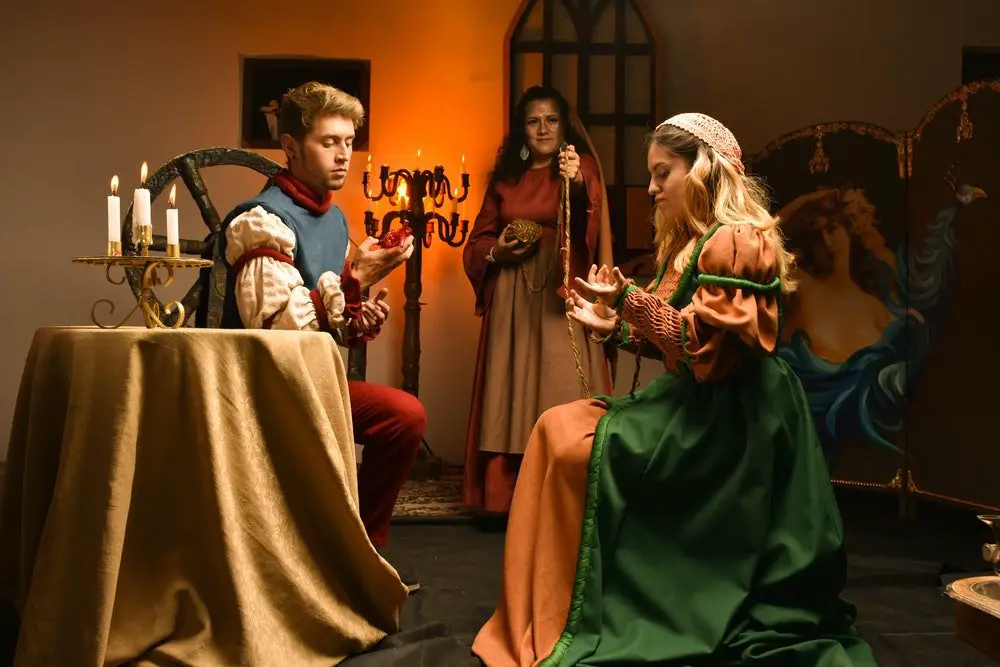If you’re here, it’s probably because you’re wondering whether you have to be fluent in the language you sing in.
Don’t worry, the answer is not “yes, you absolutely have to be fluent”.
In fact, only a small percentage of all opera singers speak fluently all the languages they sing in.
However, to answer this question, think about how fluent actors need to be in the language they speak in a movie.
Some of them just learn and reproduce the sounds, and memorize their lines.
However, they wouldn’t be capable of expressing a scene to its fullest emotional extent without being fairly fluent in the meaning, tone, context, and diction of the words they’re saying.
It’s the same in opera.
So, do opera singers need to be fluent in the language they sing in?
No, they don’t need to be fluent in a language in order to sing an opera in that language.
However, the singer should definitely know the diction of the language as well as the meaning, tone, and context of the lyrics they’re singing.

How Can Opera Singers Learn the Diction of The Language They Sing?
As we said, opera singers should at least be able to pronounce the words of the lyrics they’re singing correctly.
Ideally, they should feel confident pronouncing those words.
There are two main options for opera singers to learn the diction of the language they sing in.
There is the International Phonetic Alphabet to help them learn single sounds in the language they want to sing in.
If you’re a singer and you’d like to learn the sounds of Italian with a focus on music, we recommend reading our post about Italian Diction for Singers.
Also, opera singers usually tend to seek the help of a coach experienced in the language. This coach would mainly focus on pronunciation and diction rules.
There are specific techniques for signers (you probably know this if you’re a singer), so if you want to improve your diction, we recommend looking for a diction coach rather than an actual language teacher, unless you want to be fluent in the language in all aspects and not just in pronunciation.

Do Opera Singers Need to Understand what They Are Singing?
What do you think?
You probably agree with us in thinking that opera singers definitely need to understand what they are singing.
They should know the meaning of what they’re singing or saying in order to portray it properly.
It also helps with their interpretation and appropriation of the lines. And they probably convey feelings and emotions much better if they really embrace and internalize their lines’ meanings.
Not only do they need to understand what they’re saying but they should also know the meaning of the lines of the characters they share scenes with.
In any case, the language used in opera is rarely useful in day-to-day conversations. Likewise, common language is not often useful in opera.
So, it is important for opera singers to know the meaning of what they are singing or saying. However, it is not compulsory for them to be fluent in understanding the language.
Actually, it’s more important for them to be able to reproduce the sounds correctly and know about what they’re singing.
But if they don’t speak or understand the language they sing in, they can just focus on the translation of the lyrics.
This is when translation comes in very handy.
Do opera singers have to be fluent in Italian?
Many operas are in Italian so, usually, professional opera singers have some knowledge of the Italian language.
However, not all of them are fluent in Italian.
In fact, being fluent means speaking almost like a native speaker and that’s probably not their aim.
You can learn to sing in Italian without speaking Italian.
However, if you speak some Italian and are an opera singer, it’ll definitely be beneficial in terms of understanding the lyrics without the need of a translation.
Also, it’ll be easier and faster to memorize the words of the lyrics if you already have some knowledge about Italian sound combinations.
If you are or want to be an opera singer and don’t speak any Italian at all, it’ll certainly be worth learning some Italian. Keep in mind Italian is one of the main languages in opera, so learning Italian should probably be a priority over other languages.
Having said that, if you’re not an opera singer but would like to learn Italian, we encourage doing so because Italian is beautiful, musical, and romantic, so why not give it a go?

How Can Opera Singers Learn Italian?
If you’re an opera singer and are motivated enough to actually learn Italian, there are many options for you.
First of all, if you enjoy music, we recommend listening to Italian music. Don’t worry if you don’t understand the words.
You know more than anyone else that being exposed to the sounds of a language helps in reproducing them at a later stage. You could also try to reproduce the sounds you hear immediately.
If you’re an absolute beginner, we recommend learning about Italian grammar and vocabulary. You could also try our audio course “Ripeti con me!”.
You could also attend group lessons. This would help you communicate with other people in Italian.
Alternatively (or in addition), you could go to 1-to-1 lessons. This way, you would make sure your teacher gives you personalized lessons.
You could even tell them about your passion for opera. They would probably keep that in mind to make the learning process more music-oriented, and thus, more exciting for you.
If you like watching movies, you could watch Italian movies with subtitles.
Or if you already speak some Italian, you could watch them in the original language with Italian subtitles.
If you prefer reading, you could read articles or books in Italian.
The best you could do is go to Italy and surround yourself with Italians.
Going to an opera house in Italy and understanding the lyrics without having to check the supertitles every two seconds is probably every opera singer’s dream.



